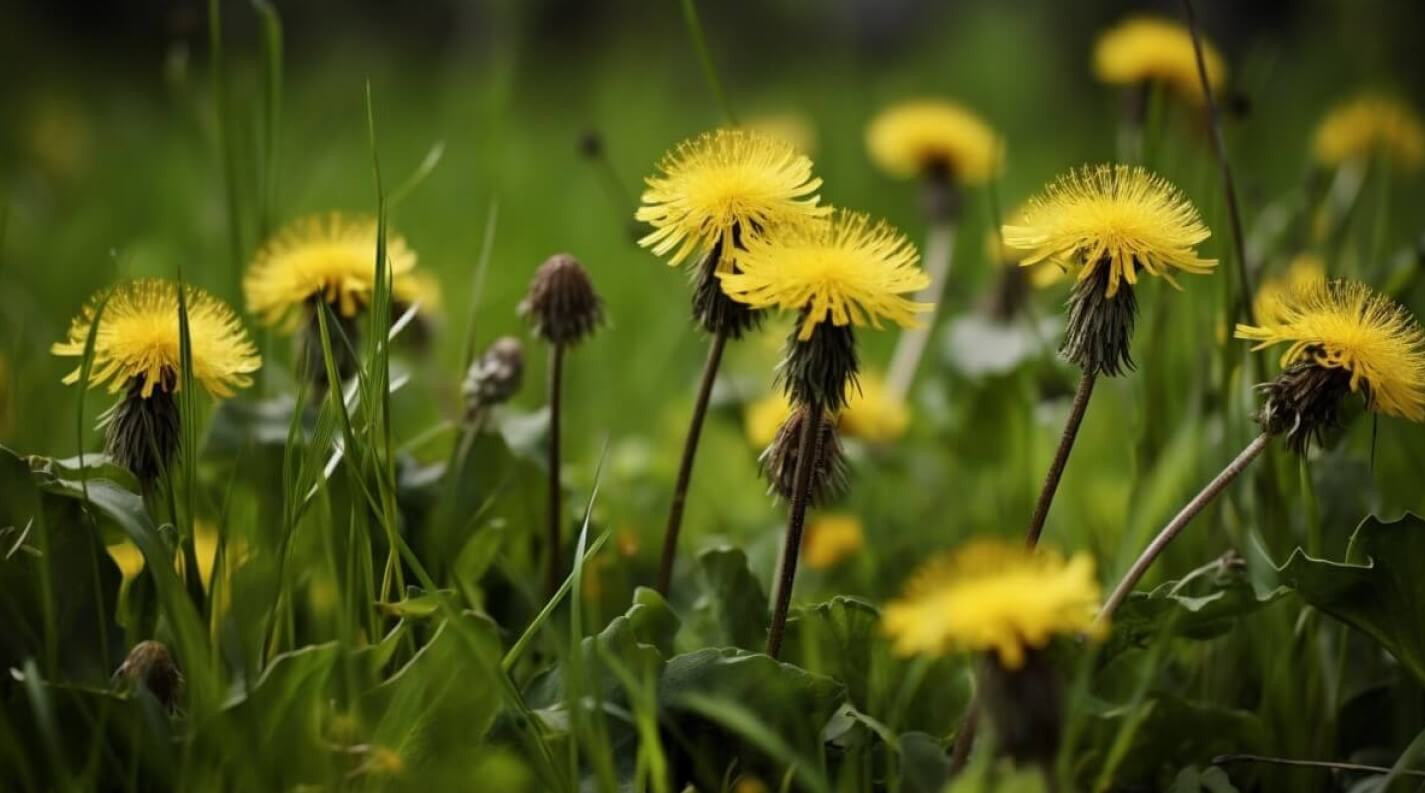Would you prefer to listen to a short podcast discussion about this article? Click on the audio below.
Dandelions are often viewed as unwelcome weeds that spoil the pristine beauty of manicured lawns and gardens. But beyond their reputation as pesky plants, dandelions offer a wealth of often overlooked benefits. In fact, dandelions are packed with nutrients and possess numerous medicinal properties that are beneficial to both humans and the environment.
This article will explore the many ways in which dandelions can be used in cooking and alternative medicine, as well as their role in promoting ecological sustainability. By the end of this article, you’ll have a newfound appreciation for this remarkable plant and its many benefits.
Table of Contents

Introduction to Dandelions and Their Ecological Benefits
What are Dandelions?
Dandelions are yellow flowering plants that are often considered a weed due to their invasive nature. They are found all over the world and are easily recognizable due to their bright yellow petals and fluffy, white seeds that disperse in the wind. While many people view dandelions as a nuisance, they actually have a variety of ecological and medicinal benefits.
Ecological Benefits of Dandelions
Dandelions have a deep taproot that can help break up hard soil and is a great natural aerator. The plant also produces pollen that attracts bees, making it an important source of food for pollinators. Additionally, dandelions can help prevent soil erosion and provide a natural source of nitrogen, which is essential for plant growth.
Why are Dandelions Important for the Environment?
Dandelions play an important role in maintaining a healthy ecosystem. By providing food and habitat for pollinators, they help ensure the success of other plants in the area. Their deep roots also help prevent soil erosion and improve the soil’s overall health.
Nutritional Value (and Health Benefits of Dandelions)
Overview of the Nutritional Value of Dandelions
Dandelions are a great source of vitamins A, C, and K and minerals such as iron, calcium, and magnesium. They are also rich in antioxidants, which help to protect the body from free radicals.
Health Benefits of Dandelions
Dandelions have been shown to have a variety of health benefits, including improved liver function, decreased inflammation, and a stronger immune system. They have also been used to treat digestive issues and lower blood pressure.
Dandelions for Detoxification and Weight Loss
Due to their high nutrient content and ability to support liver function, dandelions are often used in detox diets. They are also a natural diuretic, which can help reduce water weight and bloating.
Culinary Uses of Dandelions in Recipes
Introduction to Cooking with Dandelions
Dandelions are a versatile ingredient that can be used in a variety of recipes, including salads, soups, and teas. They have a slightly bitter taste, which can be balanced by pairing them with sweeter ingredients.
Creative Recipes Using Dandelions
Some creative recipes using dandelions include dandelion pesto, dandelion soup, and dandelion smoothies. Dandelion greens can also be sautéed and used as a side dish.
How to Incorporate Dandelions into Your Meals
Dandelions can be harvested from your backyard, but be sure to avoid areas treated with pesticides. The flowers and leaves can be used in a variety of dishes, and the root can be roasted and used as a coffee substitute.
Medicinal Properties of Dandelions (and Their Uses in Alternative Medicine)
Overview of the Medicinal Properties of Dandelions
In addition to their nutritional value, dandelions also have a variety of medicinal properties. They have been used to treat ailments such as acne, eczema, and arthritis.
How Dandelions are Used in Alternative Medicine
Dandelions are often used in herbal remedies and teas. They have also been used topically to treat skin conditions and wounds.
Dandelions for Skin Health and Wound Healing
Dandelions contain antibacterial and anti-inflammatory properties, which make them effective for treating acne and other skin conditions. They have also been used to promote wound healing by reducing inflammation and promoting tissue regeneration.
How to harvest dandelions and prepare them for cooking or medicinal use
When and where to harvest dandelions
Dandelions are abundant and easy to spot in the spring and early summer months. They typically grow in open areas like fields, meadows, and even lawns. It’s important to harvest them from areas that have not been treated with pesticides or chemicals. The best time to harvest dandelions is in the morning when the dew has dried, as this is when they are most flavorful.
How to properly prepare dandelions for cooking or medicinal use
Before using dandelions, cleaning and separating them from any debris is important. The leaves and flowers can be used fresh or dried for medicinal purposes, while the roots are typically dried and roasted for use in beverages. Dandelion leaves can be used in salads or cooked like spinach. The flowers can be used to make tea or infused into vinegar or honey.
Tools and equipment needed for harvesting and preparation
To harvest dandelions, you’ll need a pair of scissors or garden shears. A basket or container will also come in handy for collecting flowers, leaves, or roots. When preparing dandelions for medicinal use, a dehydrator or oven can be used to dry the leaves and flowers.
Sustainability Practices (and ethical considerations when harvesting dandelions)
Why it’s important to practice sustainable harvesting
Sustainable harvesting practices ensure that the plant populations are not depleted and the ecosystem remains healthy. Over-harvesting can lead to the extinction of a particular plant species, which can have a cascading effect on the entire ecosystem.
The ethics of harvesting dandelions
When harvesting dandelions, it’s important to respect the environment and the other organisms that call it home. This means avoiding harvesting in endangered or rare areas and avoiding damaging the surrounding environment.
Tips For Responsible and Ethical Harvesting
Some tips for responsible and ethical harvesting include only harvesting what you need, leaving some plants behind for others to enjoy, and avoiding the use of harmful chemicals or tools that can damage the environment.
Conclusion: promoting the use of dandelions for environmental and personal health benefits
Recap of the benefits of dandelions
Dandelions are not just pesky weeds but also rich in vitamins and minerals and have been used for centuries for their medicinal properties. They are also important for the ecosystem, as they provide food and habitat for various insects and animals.
Encouraging the use of dandelions for environmental sustainability
Using dandelions for food and medicine can reduce our reliance on other resources and promote sustainable practices. Additionally, by appreciating the value of dandelions, we can work towards preserving the environment.
Why you should give dandelions a try
Dandelions may seem intimidating at first, but they are quite versatile and can be used in various ways. By incorporating dandelions into your diet or supplement routine, you can reap their numerous health benefits. So, why not give them a try?
In conclusion, dandelions are much more than just pesky weeds. They offer a wide range of benefits that make them a valuable addition to our lives, our diets, and our environment. Whether you are looking to improve your health, explore new culinary possibilities, or promote ecological sustainability, these modest plants offer a wealth of opportunities for discovery and growth. So why not give dandelions a try? You never know what benefits you might reap from this unassuming and remarkable plant.
Frequently Asked Questions (FAQ)
Are dandelions safe to eat?
Yes, dandelions are safe to eat when properly harvested and prepared. However, it’s important to avoid harvesting dandelions from areas that may have been treated with pesticides or herbicides.
How can I use dandelions in my cooking?
Dandelion leaves can be used in salads, sautéed as a side dish, added to soups and stews, or used to make tea. Dandelion flowers can be used to make wine, jelly or infused into vinegar. Dandelion roots can be roasted and ground to make a caffeine-free coffee substitute.
What are the medicinal properties of dandelions?
Dandelions have been used in traditional medicine to treat a variety of conditions, including digestive disorders, skin problems, and respiratory ailments. Dandelions are also rich in antioxidants, which can help protect against cellular damage caused by free radicals.
What are some ethical considerations when harvesting dandelions?
It’s important to practice sustainable harvesting when collecting dandelions. This means avoiding over-harvesting and taking only what you need. It’s also important to harvest dandelions from areas that have not been treated with pesticides or herbicides. Finally, be respectful of the environment and the other living creatures that share it with us.
If you require any assistance with this article, please do not hesitate to Contact Us





















